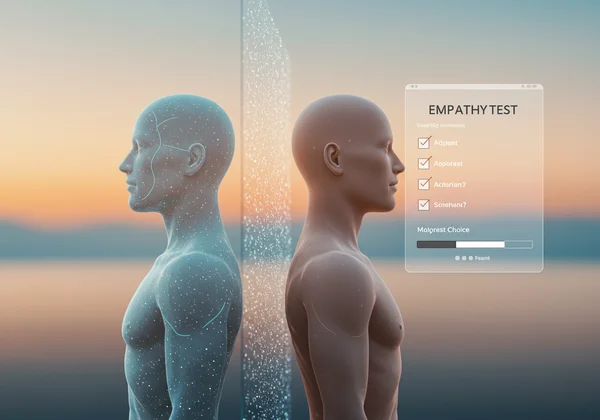关系中缺乏同理心?参加我们的同理心测试,重新连接并蓬勃发展
October 11, 2025 | By Penelope Dean
在一段关系中,感到被误解或情感上与伴侣疏远,可能是最令人感到孤立的经历之一。这通常源于同理心的缺失——那种设身处地理解他人感受的关键能力。当这种连接消失时,你们可能会感觉像是在说不同的语言。好消息是,同理心是一种技能,而非固定不变的特质。通过了解低同理心的迹象并学习可行的策略,你可以重建亲密感,培养更深层次、更有意义的纽带。 关系中缺乏同理心 的挑战是真实存在的,但你们可以共同克服。参加 同理心测试 可能是确定同理心差距是否是你们连接问题的真正根源的有力第一步。
了解你们双方的立场是迈向成长的第一步。一个很好的起点是 了解你的同理心得分,为你的个人旅程获得一个基线。

识别关系中低同理心的影响
在你建立桥梁之前,你必须首先认识到分歧。低同理心并不总是表现为冷漠或残忍;通常,它的迹象是微妙但具有腐蚀性的。它可能是持续性地忽视你的感受,在争执中无法从你的角度看问题,或者在你最需要时普遍缺乏情感支持。这也不仅仅是关于你的伴侣。有时,我们忙碌的生活或未解决的问题也会导致我们变得不如我们所希望的那样富有同理心。一项全面的 同理心测试 可以帮助突出这些需要自我反思的领域。认识到这些模式是自我意识的关键一步,也是修复关系的第一步。
你的伴侣(或你)缺乏同理心的微妙迹象
识别同理心缺陷需要超越明显的行为。它关乎于注意沟通和情感反应中的模式。以下是一些需要注意的迹象:
- 对话是单向的: 他们经常把话题转回到自己身上,自己的问题或经历上,而不顾及你的感受。
- 难以换位思考: 在争吵中,他们很难理解你的观点,常常坚持自己的解释是唯一正确的。
- 轻蔑的回应: 你的感受经常被“你反应过度了”、“这没什么大不了的”或“你不应该那样感觉”等短语回应。
- 对你的内心世界缺乏好奇心: 他们很少真正感兴趣地询问你的感受、梦想或恐惧。
- 言行不一: 他们可能会说“我很抱歉你感到不高兴”,但他们的行为并没有改变,这表明认知理解与情感反应之间存在脱节。
情感代价:误解如何侵蚀连接
当同理心低下时,关系的基石——信任和情感安全——便开始瓦解。持续感到不被倾听或被否定会导致深刻的孤独感,即使你们身体上在一起。这种情感代价可能导致怨恨、频繁为小事争吵,以及彼此之间缓慢而痛苦的疏远。缺乏共同理解会筑起一道无形的墙,使真正的亲密感变得不可能。随着时间的推移,这种连接的侵蚀可能使双方都质疑关系本身的未来。

如何与缺乏同理心的伴侣相处:第一步
与一个缺乏同理心的伴侣维系关系可能充满挑战并耗费情感。你的首要任务必须是保护自己的福祉,同时为改变创造机会。这并非指责或归咎;而是建立新的相处规则,以尊重你的情感需求。了解伴侣的困境,也许在他们参加了 在线同理心测试 之后,可以指导你的方法,并将动态从冲突转向合作,为更健康的互动和共同成长铺平道路。
同理心低下时如何沟通你的需求
当你觉得伴侣不理解你时,本能反应可能是提高音量或变得更情绪化。然而,更有效的方法是冷静清晰地沟通。使用“我”开头的陈述来表达你的感受,而不是指责对方。例如,与其说“你从不听我说话”,不如尝试说“当我谈论我的一天时,我觉得不被倾听,如果我们可以抽出一些时间来连接,我会很开心。”这会将问题从对他们品格的攻击重新定义为关于你需求的陈述,使他们更容易倾听你而不会产生防御心理。
设定健康界限并保护你的福祉
你无法强迫某人富有同理心,但你可以控制自己如何回应缺乏同理心的情况。 设定健康界限 至关重要。这可能意味着声明如果对话变得轻蔑,你将不会继续;或者在冲突后你需要空间来处理情绪。界限不是惩罚;它们是你为自己设定的规则,以维护你的情绪健康。它们教会你的伴侣你需要如何被对待,并在关系中为你创造一个更安全的空间。

搭建桥梁:改善关系同理心的7个可行步骤
同理心就像一块肌肉——可以通过有意识的练习来增强。重建 关系同理心 是一段你们可以共同踏上的旅程。它需要双方伴侣的承诺去倾听、学习和成长。这七个可行的步骤是实用的练习,可以帮助你和你的伴侣在更深层次的情感上重新连接,将误解转化为共同的理解。
-
练习积极倾听: 这意味着倾听不仅仅是为了回应,而是为了真正理解。放下干扰,进行眼神交流,并给予伴侣你全部的注意力。当他们说完后,总结你所听到的(“所以,听起来你感到不知所措是因为……”),以确保你理解正确。
-
进行换位思考练习: 养成习惯,经常从伴侣的角度设想一个情境。你甚至可以把它变成一个游戏:从他们的角度描述最近的一次冲突。这个练习能建立起真正同理心所需的心理路径。
-
验证感受,即使你不同意: 验证不是关于同意;它是关于承认。你可以说:“我理解你为什么会对此感到愤怒”,即使你不同意他们的反应。这个简单的举动表明你尊重他们的情感体验,让他们感到被看见。
-
培养脆弱性和共享经历: 创建连接的仪式。这可能是一个每周的“签到”,你们双方在没有评判的情况下分享自己的高潮和低谷,或者只是问一些更深层次的问题,比如“你今天最棒的部分是什么?”脆弱性会滋生同理心。
-
一起阅读小说或观看电影: 研究表明,沉浸在故事中可以增加同理心。一起讨论角色的动机和感受,是一种低压力的练习,可以共同理解不同的视角。
-
学习彼此的“情感语言”: 留意你的伴侣如何表达痛苦、喜悦和恐惧。他们不高兴时会退缩吗?他们高兴时会变得更健谈吗?理解这些非语言线索是同理心沟通的有力形式。
-
必要时寻求专业指导: 如果同理心差距大到无法自行弥合,伴侣治疗师可以提供宝贵的工具和中立的空间来促进沟通。寻求帮助是力量的象征,而不是失败。

你的同理心之旅:重塑连接的第一步
踏上这段改善关系中同理心的旅程,是对彼此幸福和成长的有力承诺。但在你有效建立新技能之前,了解你的起点会有所帮助。自我意识是所有有意义改变的基础。了解你自己的同理心倾向——你的优势和发展领域——为个人成长提供了清晰的路线图,这将直接有益于你的关系。
发现你的同理心得分:成长的基石
知识就是力量。花点时间评估你自己的同理心水平可以提供深刻的见解。它帮助你了解你如何自然地与他人建立联系,以及你可能存在的盲点。你的认知同理心(理解他人的视角)是否比你的情感同理心(感受他人的情绪)更强?回答这些问题是迈向有意识改变的第一步。我们邀请你 参加同理心测试,以更清晰地了解你的同理心概况。
你的下一步:建立更具同理心的关系
关系中缺乏同理心可能感觉像是一个不可逾越的障碍,但这很少是故事的结局。它是一个邀请,邀请你们更投入,更刻意地沟通,并学会更好地爱彼此。通过识别迹象、设定健康界限并积极练习同理心行为,你可以将你们的连接从疏远转变为深刻而富有韧性的亲密。
最终,一段更具同理心的关系始于自我意识。准备好探索你的同理心了吗?立即 开始你的同理心之旅,解锁更深层次的连接。
关于关系中同理心的常见问题解答
缺乏同理心的关系能长期存续吗?
一段关系可以存续,但如果没有基础的同理心水平,它不太可能蓬勃发展。从长远来看,缺乏同理心往往会导致怨恨、孤独和情感距离。然而,如果双方伴侣都愿意努力培养这项技能,存续可以转化为一种蓬勃发展、深度连接的伙伴关系。
伴侣同理心低下的主要原因是什么?
低同理心可能源于多种原因,包括成长经历、过去的创伤、某些人格特质,甚至高压和倦怠。它不总是一个性格缺陷的标志,而可能是一种防御机制或一项未充分发展的技能。了解根本原因会有所帮助,但重点应放在当下练习更多富有同理心的行为上。
一个缺乏同理心的人能学会真正去爱吗?
这是一个复杂的问题。爱和同理心是紧密相连的。虽然一个同理心很低的人可能难以以一种让伴侣感到情感上被认同的方式建立连接,但他们仍然可以感受到依恋和关怀。更重要的是,同理心是一项可以培养的技能。通过有意识的努力和练习,一个人可以学会表现得更富有同理心,这可以显著加深他们建立爱的连接的能力。
在线同理心测试对关系洞察准确吗?
在线 同理心测试 对于自我反思和开启对话非常有价值。虽然它不是临床诊断,但一个设计良好的 免费同理心测试 可以提供你倾向的快照,并突出成长领域。它作为个人和情侣获得自我意识的绝佳起点,而自我意识是改善关系动态的基石。